Let's face it, in today's competitive business landscape, almost all organizations face data-related challenges, especially when it comes to translating the data they collect into meaningful insights for things like keeping up with competitors, optimizing marketing efforts, and improving operational efficiencies.
Data analytics is the key to revealing these crucial insights within a business's data by transforming raw information into actionable intelligence for accelerated growth, improved decision-making, and removing operational roadblocks.
Understanding data analytics: Definition and types
Modern businesses constantly gather large amounts of data, yet this raw data holds little value until it's analyzed and converted into meaningful insights. By utilizing insights extracted from data analysis, businesses and organizations gain a deeper comprehension of their audience, sector, and overall company, equipping them to make better decisions and plan more effectively for the future.
Learn how data analytics is transforming manufacturing processes by visiting our Manufacturing industry page.
What is data analytics?
Data analytics is the key tool businesses use to discover patterns within large datasets.
Data analytics can be applied to data sets of any size. However, as businesses accumulate larger amounts of data over time, faster and more accurate data analysis becomes critical for better predictions and pattern identification.
Data tools can gather information from multiple locations and sources, creating a full-picture view for analyzing past and predicting future trends. They also empower businesses to base their strategies on solid evidence rather than guesswork.
Unleash the Full Power of Your Data With Our Expert Techniques and Insights.
Download Now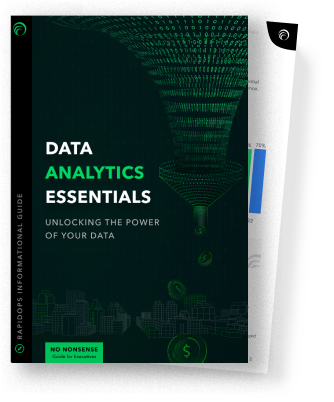
Each data analytics type serves a unique purpose in information analysis and provides different business insights.
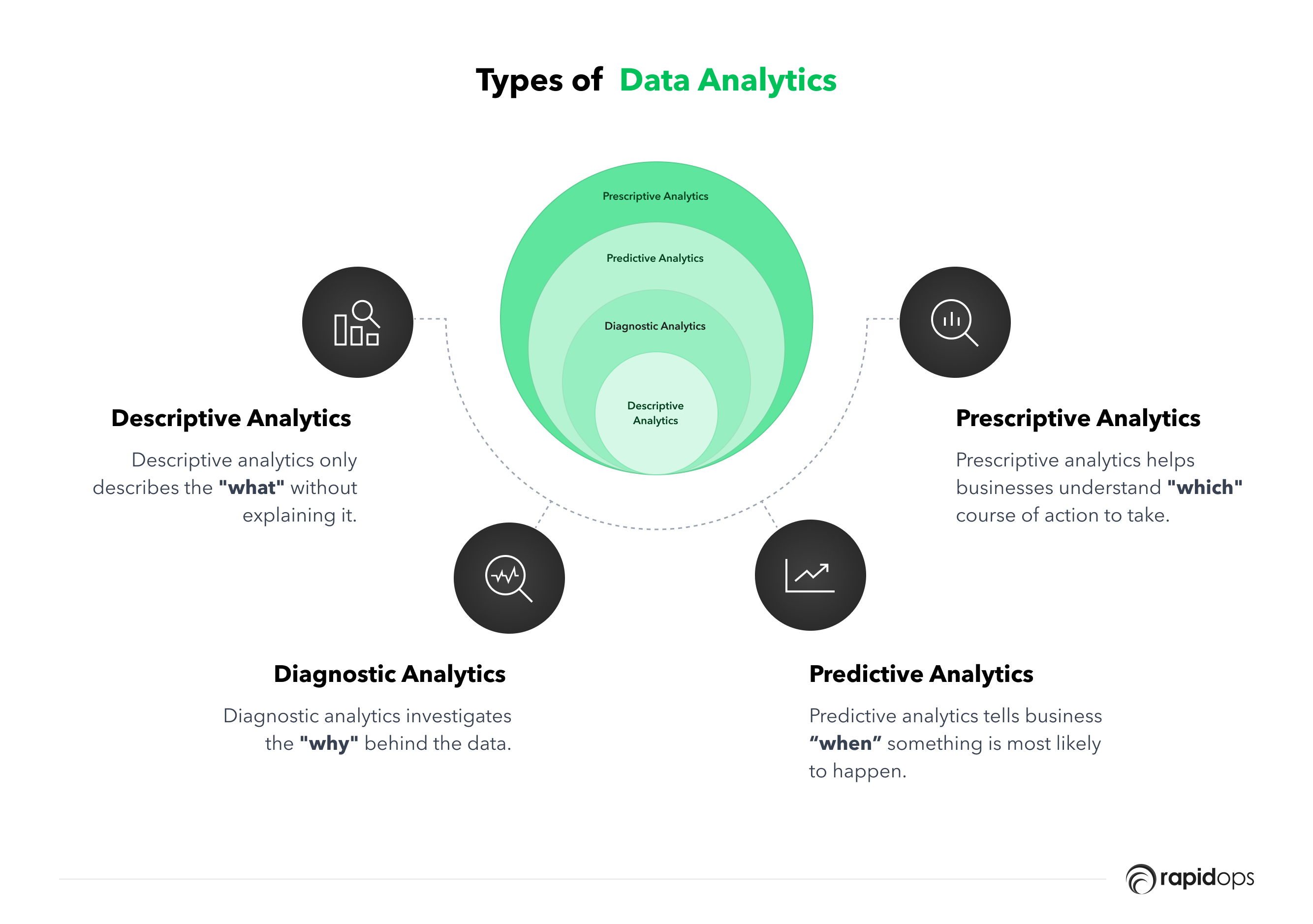
1. Descriptive analytics
Descriptive analytics is a basic analysis that examines past events. Using data aggregation and data mining, analysts collect and summarize data to identify patterns. Descriptive analytics only describes the "what" without explaining it.
2. Diagnostic analytics
Diagnostic analytics investigates the "why" behind the data. Analysts pinpoint anomalies and explore additional data sources to reveal causal relationships. Techniques include probability theory, regression analysis, filtering, and time-series data analytics.
3. Predictive analytics
Predictive analytics estimates future outcomes using historical data and probability theory to tell the business "when" or "if" something is most likely to happen. It provides data-driven insights for business decisions, projecting outcomes like product demand or revenue changes. Predictive analytics improves decision-making accuracy.
4. Prescriptive analytics
Prescriptive analytics predicts outcomes and suggests actions to achieve goals and helps businesses understand "how" to use the data to meet business goals or "which" course of action to take. Using optimization techniques, simulation models, and decision-making algorithms, it provides actionable insights to optimize processes, improve decision-making, and increase efficiency.
NOTE:
Data analytics is not a one-size-fits-all solution. You must choose the right type of analytics based on your specific needs and goals. You must also a way of assessing your business’ data strengths and weaknesses and where can your data lead you in the future.
At Rapidops, we understand the factors that drive business growth and know that data-driven insights are crucial for making decisions. We're committed to helping businesses in various industries unlock the full potential of their data by providing customized analytics solutions tailored to their unique needs and objectives. Let our experienced data experts help you choose the right data analytics type.
Why is data analytics essential for businesses?
Data analytics has become an essential tool for modern businesses as it enables analysis of vast data sets to gain better insights which can help them make informed decisions.
The role of data analytics in business decision-making
Be it large corporations or small startups, all of them must make informed decisions quickly to gain a competitive edge in this data-driven market. Data analytics can identify growth opportunities, optimize operations, and improve customer satisfaction providing organizations with that edge.
For instance, customer data analysis can identify patterns and preferences, allowing businesses to personalize their offerings and improve customer engagement. Analysis of operational data helps identify inefficiencies and streamline operational processes, which can reduce costs and improve productivity.
Data analytics can also help businesses make informed decisions about their marketing strategies. By analyzing customer behavior and engagement, companies can optimize their marketing campaigns, targeting the right audience with the right message at the right time.
Benefits of data analytics for your business
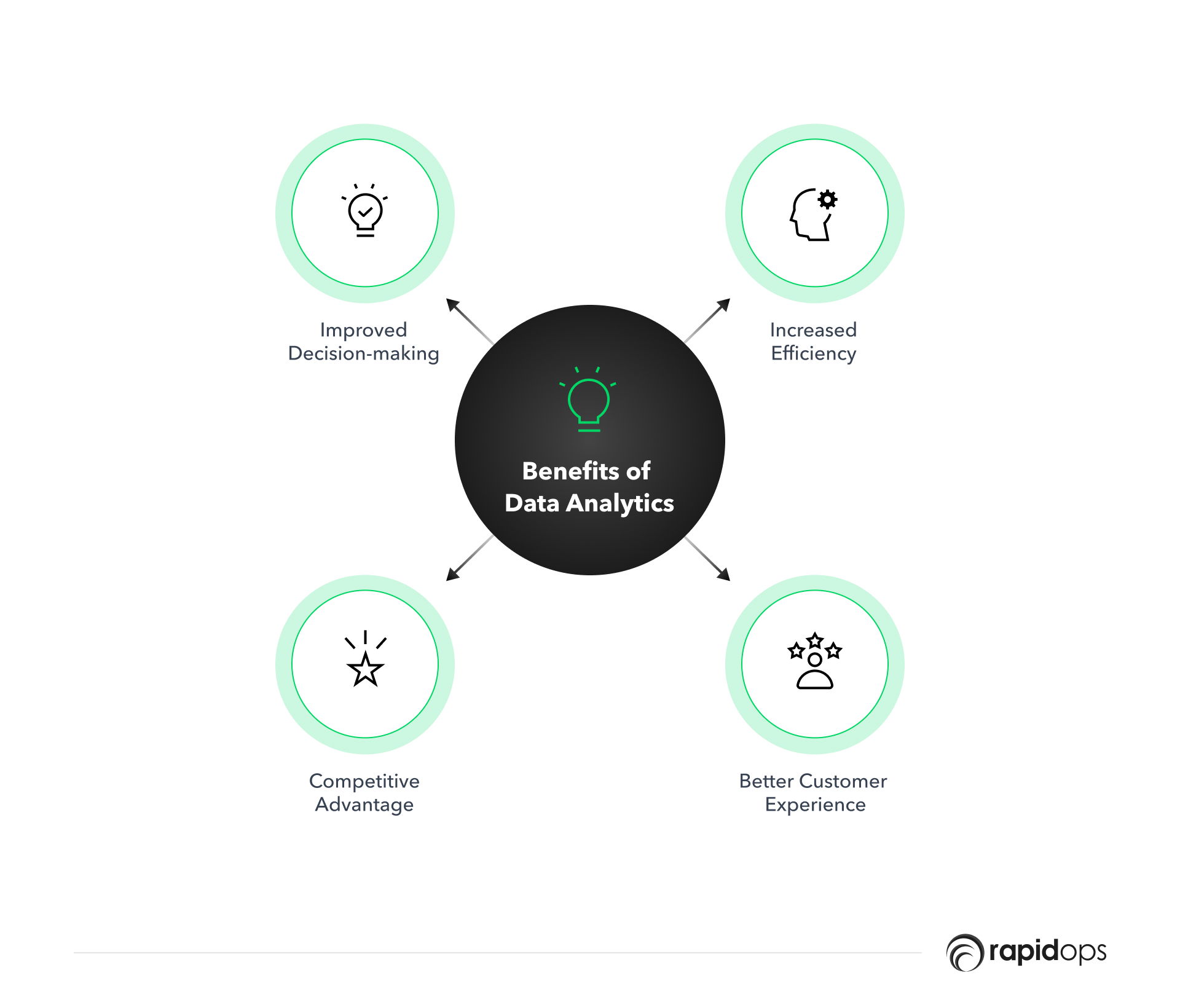
There are numerous benefits of data analytics for businesses:
1. Improved decision-making
Data analytics equips businesses with essential insights, allowing them to make well-informed, data-driven decisions quickly and confidently. This reduces the risk of poor choices that can negatively impact their operations.
2. Increased efficiency
By analyzing operational data, businesses can identify inefficiencies and streamline their processes. This reduces costs, improves productivity, and enhances overall organizational performance, leading to higher profitability.
Discover how data-driven insights can optimize logistics and improve supply chain resilience by visiting our Logistics industry page.
3. Better customer experience
Data analytics helps businesses understand and predict customer behavior. By analyzing customer data, companies can tailor and personalize their offerings, resulting in improved customer engagement, satisfaction, and loyalty.
4. Competitive advantage
Leveraging data analytics enables businesses to optimize their operations and identify growth opportunities, giving them a competitive edge in the market. By staying ahead of trends and continually refining strategies based on data insights, companies can outperform their competitors and maintain long-term success.
Real-Life examples: Businesses thriving with data analytics
Many businesses have already embraced data analytics and are reaping the benefits.
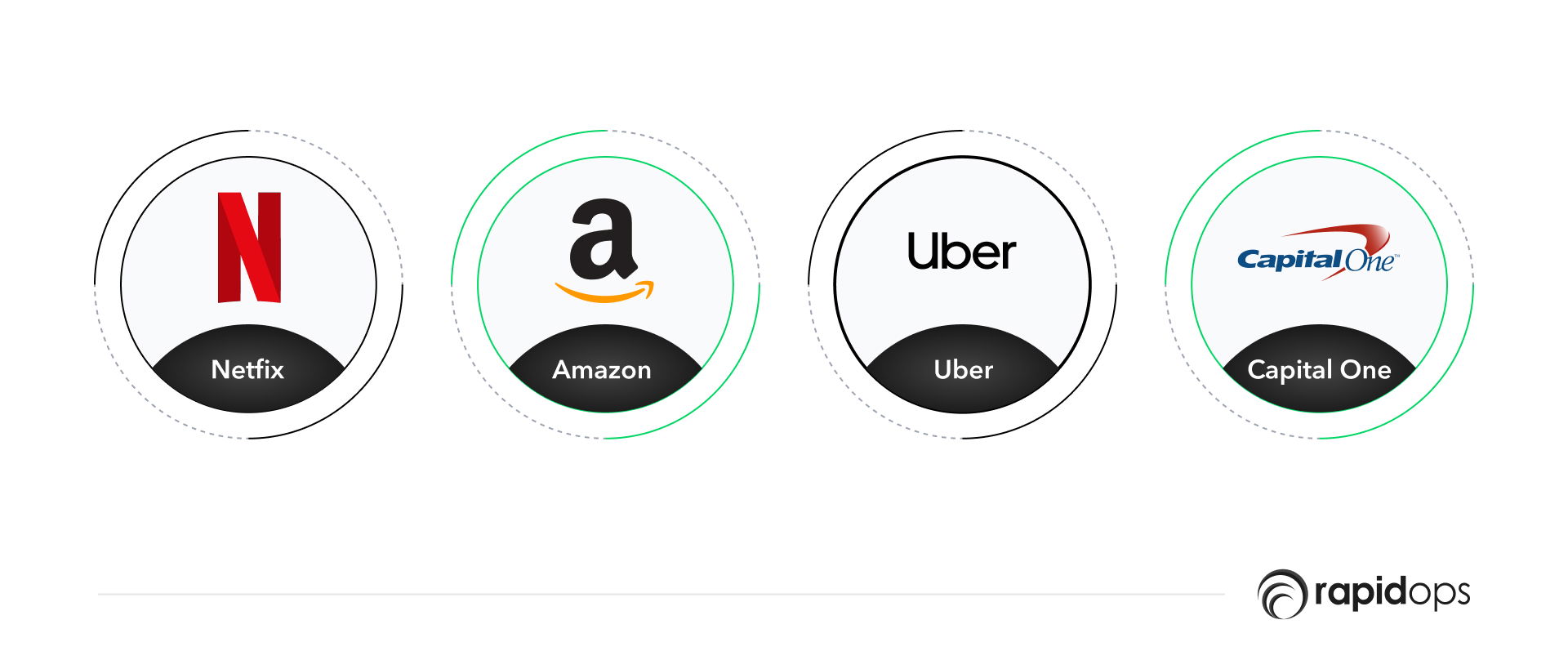
Here are some real-life examples:
1. Netflix
Netflix uses data analytics to personalize user recommendations, analyzing their viewing behavior and preferences to suggest movies and TV shows they are likely to enjoy.
2. Amazon
Amazon uses data analytics to optimize its supply chain, predicting demand and adjusting inventory levels accordingly. On our retail industry page, discover how data analytics can transform your retail operations, from personalized customer experiences to efficient supply chain management.
3. Uber
Uber uses data analytics to optimize its pricing strategy, analyzing demand and supply data to adjust prices in real-time.
4. Capital One
Capital One uses data analytics to personalize credit card offers for its customers, analyzing their spending behavior and credit history to make tailored offers.
These examples demonstrate the power of data analytics and how it can help businesses thrive in today's market.
Overcoming data analytics challenges for business success
While data analytics offers many benefits, it also presents several challenges.
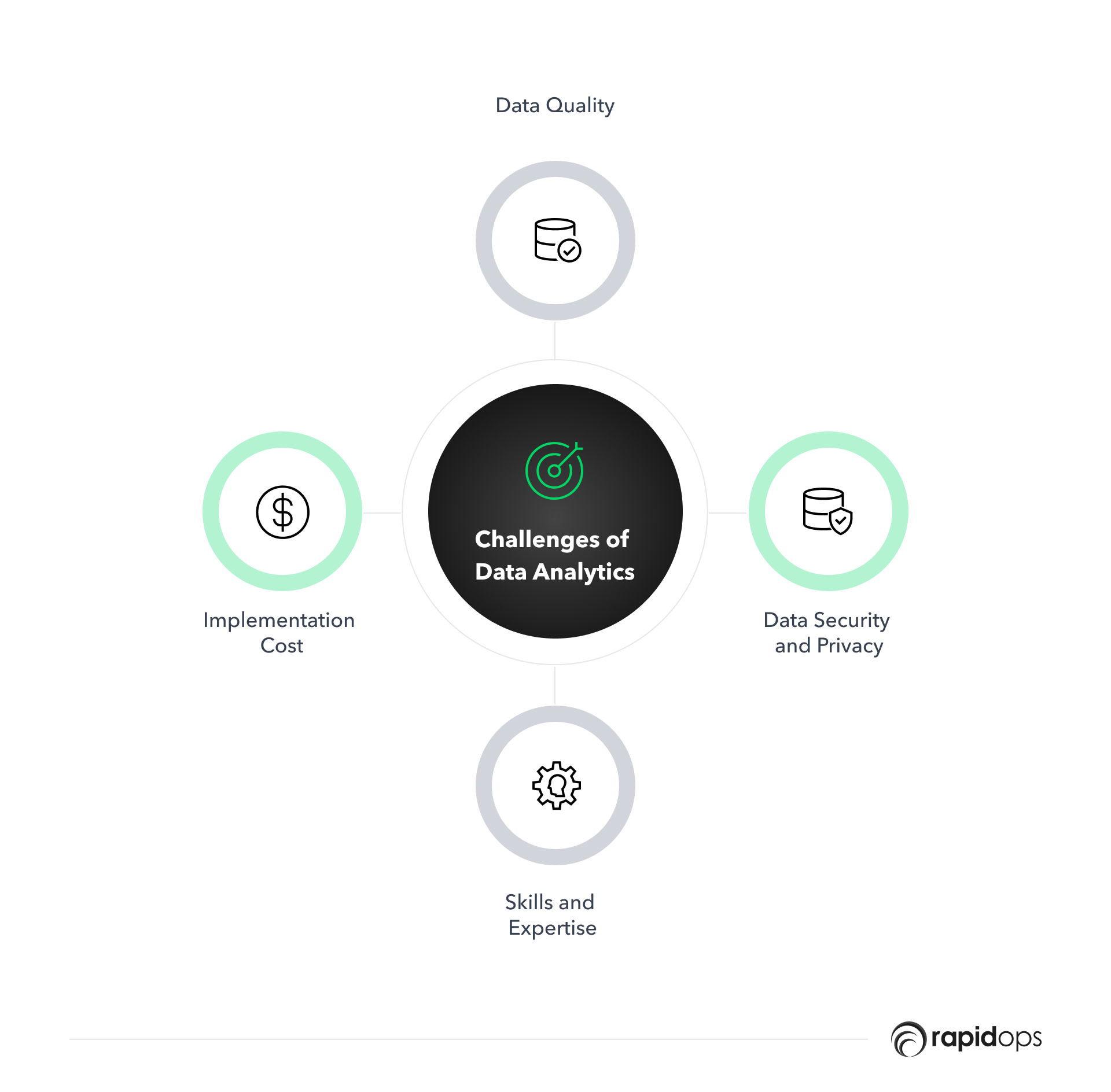
Here are some of the most common challenges businesses face when implementing data analytics initiatives:
1. Data quality
Ensuring data quality is crucial for deriving accurate insights and making well-informed decisions. Businesses must focus on maintaining their data's accuracy, completeness, and consistency to avoid misleading results and potential negative consequences for their operations.
2. Data security and privacy
As data becomes increasingly valuable, businesses must prioritize its security and privacy. Establishing robust policies and procedures, implementing encryption, and following data protection regulations are essential for safeguarding data and maintaining customer trust.
3. Skills and expertise
Successfully implementing data analytics initiatives requires the right mix of skills and expertise. Businesses may face challenges in finding and retaining talented data scientists, analysts, and engineers capable of effectively managing and analyzing large datasets.
4. Cost
Data analytics initiatives can incur significant hardware, software, and personnel investments. Companies must carefully consider the costs associated with implementing data analytics solutions while weighing the potential benefits and long-term value these initiatives can bring to their organization.
Overcoming these challenges requires careful planning and execution, and businesses must be prepared to invest time and resources to achieve their goals.
Concluding thoughts: So, what is going to be your next step?
New technologies, tools, and techniques are constantly emerging, and companies must stay informed about these advancements. By adopting data analytics initiatives, companies can enhance their competitive position, streamline operations, and deliver improved customer experience.
However, implementing data analytics also presents specific challenges, necessitating meticulous planning and execution. Businesses must be ready to adapt and grow as they embrace data analytics to keep up with the evolving landscape.
One way to ensure your business is ready is by leveraging the resources of a trusted data analytics partner, like Rapidops, that can help you build a system that can process vast amounts of unstructured data and turn them into valuable insights for making better-informed decisions.

Saptarshi Das
Content Editor
9+ years of expertise in content marketing, SEO, and SERP research. Creates informative, engaging content to achieve marketing goals. Empathetic approach and deep understanding of target audience needs. Expert in SEO optimization for maximum visibility. Your ideal content marketing strategist.

Let’s build the next big thing!
Share your ideas and vision with us to explore your digital opportunities
Similar Stories
- Analytics
- undefined Mins
- July 2019


Receive articles like this in your mailbox
Sign up to get weekly insights & inspiration in your inbox.


